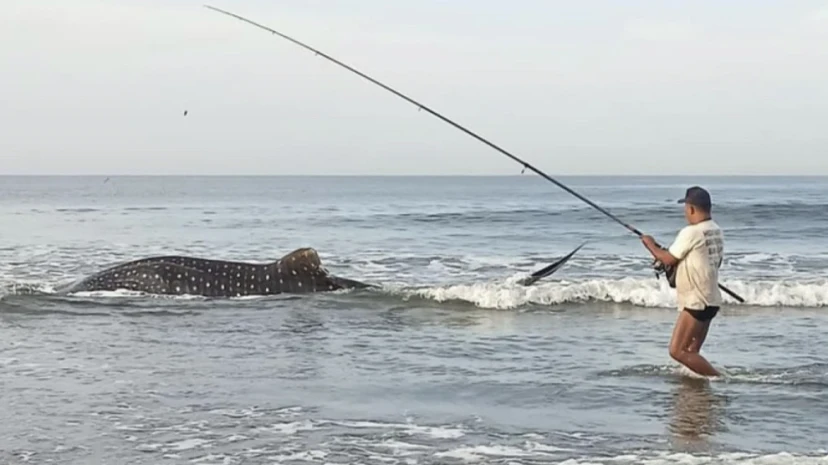Two whale sharks have washed ashore in Indonesia, one found in Bali and the other on the beach in Central Java. This is not the first occurrence of such incidents in the last few months.

Despite being considered an endangered species with declining numbers, whale sharks in Indonesia are now protected by the government. However, dead or barely alive individuals are regularly discovered stranded on the shore.
In the recent Bali case, the situation was less dramatic as local residents and tourists managed to return the shark to the ocean. This effort was led by a snack kiosk owner who discovered the shark early in the morning on the Pekutatan beach in Jembrana. According to him, the fish was approximately 7 meters long and initially appeared lifeless. Upon closer inspection, he noticed signs of life and observed the marine creature attempting to return to the water.
"After I saw [that the whale shark was still alive], I immediately informed those I met on the same beach. Soon, many people gathered, and together we tried to push it back," he said.
Eyewitnesses reported that in addition to locals, at least 10 foreigners participated in the rescue efforts on the beach in Jembrana. Together, they successfully pushed the animal back into the water, saving it. The last sighting of the shark was as it swam away over the horizon.
This marks the first instance in recent months where a whale shark returned alive from this beach to the ocean. Three previous individuals perished, and the results of their autopsies revealed plastic waste, mainly straws, and ice cream sticks, alongside remnants of small fish in their stomachs.

Regarding the second instance of a whale shark appearing near the shore, the attempt to save the individual found on the beach in Central Java was unsuccessful. This marks the sixth occurrence of such a situation. The fish's carcass was discovered early in the morning, initially mistaken for a large tree washed ashore by local fishermen. However, upon closer inspection, it was identified as a whale shark.
Efforts were made to rescue it, involving a team of 20 people, but half an hour after its discovery, the fish perished. According to fishermen's estimates, this individual measured approximately 4-5 meters in length and weighed up to 500 kg. The head of the Natural Resource Conservation Center in the Chilachap resort (BKSDA) in Central Java confirmed that this large fish species is protected in Indonesia under the Minister of Maritime Affairs and Fisheries Decree No. 18 of 2013.
"As this is a protected species, we monitor it from the beginning when the fish is stranded. We have also reported this to PSDKP (General Directorate of Marine Resources and Fisheries Supervision of the MMAF)," he added. The head of the Natural Resource Conservation Center in Chilachap acknowledged that there are numerous factors leading to whale sharks being stranded.
"One of them is the condition of the individual. It is quite likely that the whale shark is already weak or unhealthy. It is also possible that the navigational system, such as sonar, is damaged," he said. In such conditions, officials explained, whale sharks can deviate from their course, ultimately ending up stranded and unable to return to the deep sea.
Another factor is environmental conditions. Whale sharks hunt small fish and plankton, and sudden temperature fluctuations or large waves can affect the behavior of these prey species. They move towards the shore, followed by predators. However, such proximity to land is dangerous for large fish, and once trapped, the shark cannot return to the sea.
According to an oceanographer from the National Research and Innovation Agency (BRIN), potential factors leading marine animals to strand include underwater noise, ocean pollution, extreme tides, and depletion of prey.
Another researcher and environmental activist stated that there is another threat to the existence of whale sharks in the ocean: tourist excursions, particularly swimming with whale sharks. Boats often approach them too closely, posing a risk of injury from propellers, for example.
He also agreed with the pollution factor. Whale sharks are filter-feeding fish, capturing microscopic organisms with large amounts of water through their mouths. The water is then filtered through gill slits, and the edible microorganisms go to the stomach. Consequently, they often ingest plastic floating in the ocean along with their food.
There is also a threat associated with fishing, where whale sharks get caught in nets or entangled in lines. Even if released afterward, the injuries sustained may lead the animal to resort to suicide.
You can add one right now!